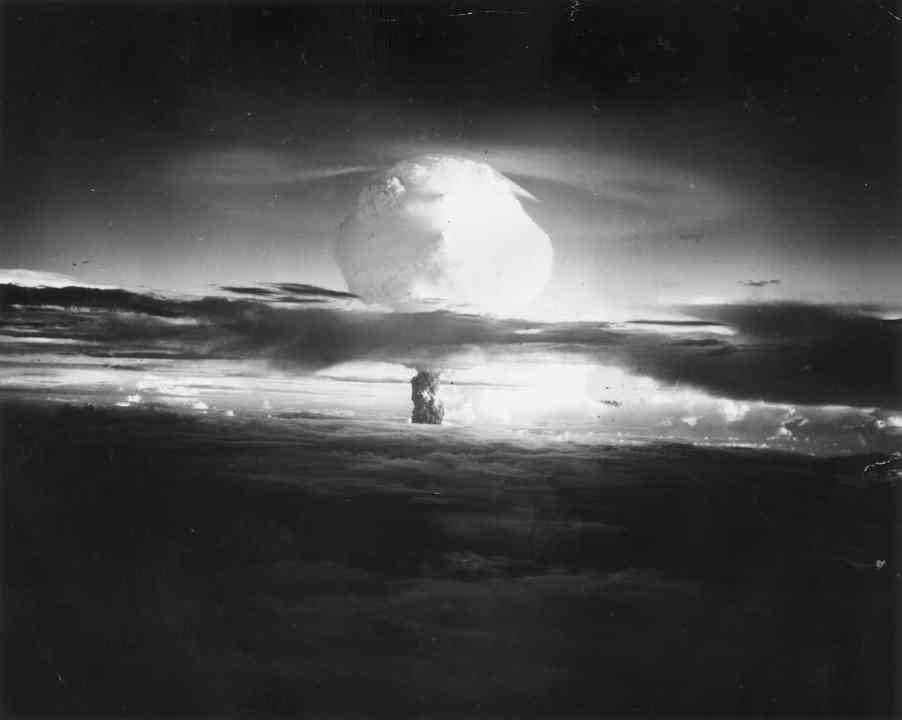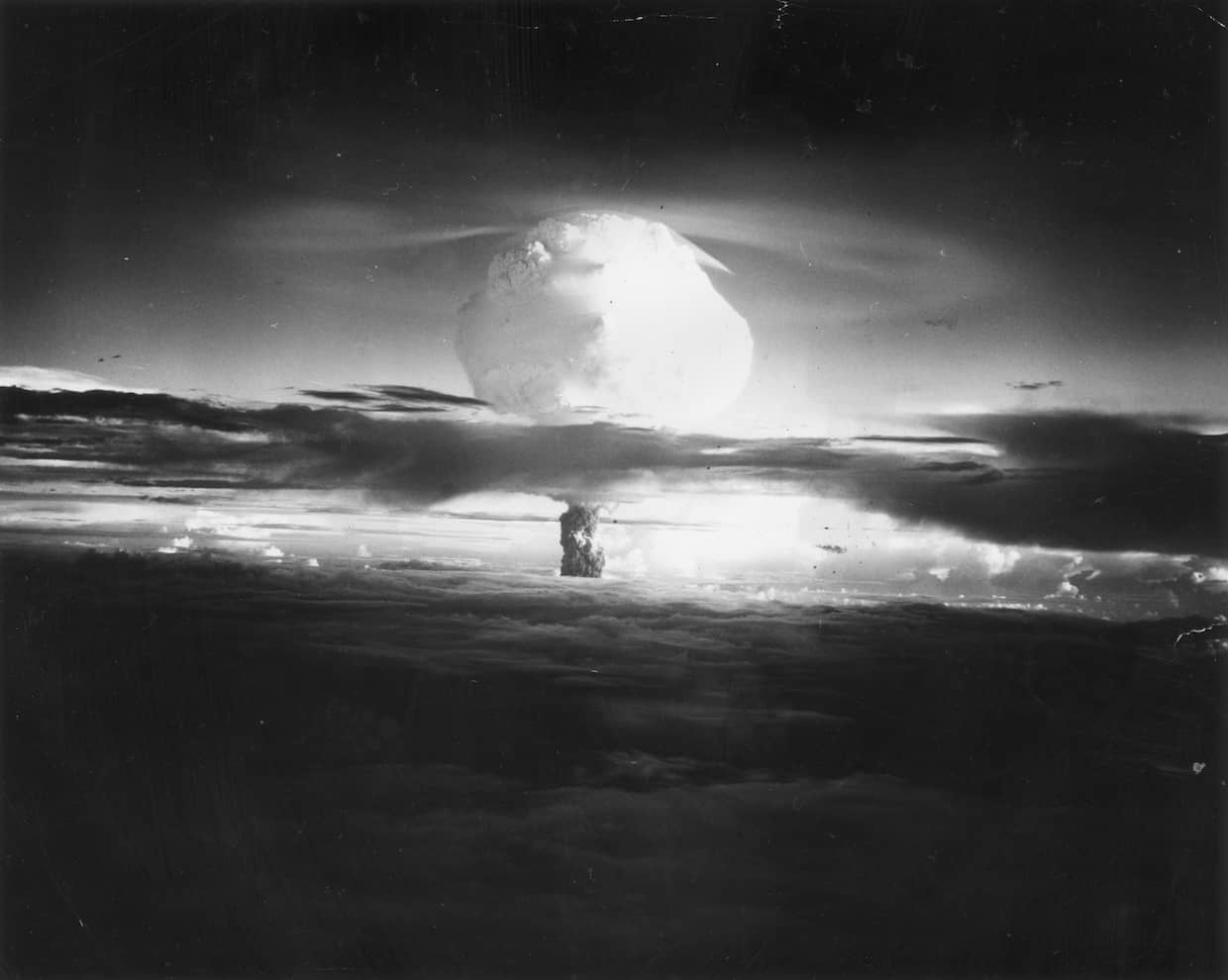The slow return of the 1980s has reached its logical conclusion. The prospect of nuclear annihilation is haunting our nightmares once again. Vladimir Putin’s invasion of Ukraine has been marked by a willingness to engage in blatant nuclear sabre-rattling of a sort not seen since the end of the Cold War.
From his statement that anyone ‘interfering from outside’ would ‘face consequences greater than any you have faced in history’ to his placing Russia’s nuclear forces on ‘a special combat duty regime’, Putin’s strategy has been to threaten nuclear war to keep the West out of what he sees as his business.
But these threats don’t mean that Putin is about to send missiles soaring over Europe at any moment. Nuclear analyst Pavel Podvig believes that the ‘special combat duty’ is nothing more than an elevated state of vigilance rather than an instruction to make Russia’s system ‘ready to fire’. Putin’s words are instead an attempt to disincentivise certain western behaviours.
The question of whether he would actually use these weapons is in some senses irrelevant; what matters is that we can’t be sure he wouldn’t. In much the same way that a bank teller faced with an armed robber is unlikely to push the issue of whether he’s willing to pull the trigger, Nato is unwilling to initiate a potential military conflict.
The greatest point of danger is when one side believes it can ‘win’ a nuclear exchange
To carry the analogy forward, two men with loaded weapons would be careful to interact politely and predictably, rather than making aggressive and unexpected motions.
Mutually assured destruction works because both sides believe that the use of nuclear weapons on their part would be met in kind, with any conflict entering an irreversible escalation. Because the rational response to a nuclear launch is a nuclear launch, there is no incentive to engage in one. And because conventional conflict raises the risk of nuclear war if the parties are unbalanced, there is a strong incentive to avoid that too.
In other words, so long as both of our men are sitting with their weapons drawn and loaded, neither wants to fire. Putin himself has observed that nuclear war ‘would be a global disaster for humanity’ and a thing to avoid, but that if provoked ‘I must ask myself: why would we want a world without Russia?’.
Rather than signalling imminent conflict, Putin’s rhetoric is a reminder that we should be aware of this balance. Those concerned about his sabre-rattling can find some comfort in the Russian statement on its nuclear doctrine, which lists the circumstances under which the state would consider using its nuclear weapons: the launch of ballistic missiles targeting Russia, the use of weapons of mass destruction within its territory, conventional forces threatening the existence of the Russian state, or an attempt to ‘decapitate’ Russia’s nuclear forces.
Of course, a degree of ambiguity over when and why these weapons would be used gives the threat of their deployment greater weight, and the existence of a doctrine hasn’t stopped speculation over other circumstances when they might see use. Some analysts – and the 2018 US Nuclear Posture Review – have speculated that Russia could use a strategy of ‘escalate-to-de-escalate’, deploying nuclear weapons or their threat to cement battlefield advantage or terminate a conflict. This is not contained within the Russian strategy document, although suspicious readers could find things to dislike in the phrase ‘preventing the escalation of hostilities and their termination on terms acceptable’.
It is the existence of this ambiguity, though, and a desire to avoid accidental escalation that has led Nato to firmly commit to avoiding direct conflict with Russia in Ukraine. And for all the talk, neither Russia nor America has put its forces on standby for imminent use. America has more command and control aircraft making flights, ensuring that its command chains would survive an attempt at a pre-emptive strike. Russia is making sure that its facilities are staffed.
The logic of mutually assured destruction can be counter-intuitive, but in some circumstances these actions can serve to make conflict less likely. The greatest point of danger is when one side believes it can ‘win’ a nuclear exchange – through missile defence systems, pre-emptive strikes, or other measures – destabilising the delicate equilibrium. Measures that reduce that temptation help keep things predictable.
None of this is to say you should be particularly delighted about peace being maintained by the threat of nuclear Armageddon. If nothing else, the United States refuses to adopt a ‘no first use’ stance, and the Russians have a policy that could see them sending warheads over in response to faulty equipment telling Moscow the Americans have started a war. Mutually assured destruction may have had its successes, but it has also had a string of near misses.
For all the rhetoric, nobody wants an accidental exchange of nuclear weapons. It would be by far the most embarrassing way for a sentient species to go extinct. Nato and Russia have taken sensible steps during this war to avoid the risk of escalation, keeping forces away from a hair-trigger stance, maintaining lines for urgent communication, and postponing missile tests.
That Putin might use nuclear weapons in extremis is less relevant than the fact that this uncertainty means we should never find directly confrunt Russia. As he himself has said: ‘it would probably mean the end of our civilization’.








Comments